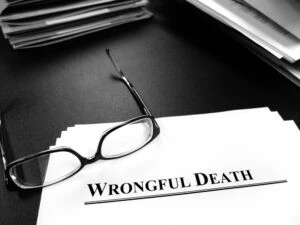
Losing a loved one is an incredibly difficult experience, especially when their death results from someone else’s negligence or intentional act. Understanding who can file a wrongful death lawsuit is crucial for those seeking justice and compensation.
This article outlines the eligible parties who can sue for wrongful death with a Long Island wrongful death lawyer, relevant statutes, and key considerations for filing a claim.
- Who Can File a Wrongful Death Lawsuit?
- Special Circumstances: Legal Representatives and Estate Executors
- Key Factors to Consider When Filing a Wrongful Death Lawsuit
- Types of Compensation Available in Wrongful Death Lawsuits
- Call Friedman & Simon, L.L.P. for a Free Consultation
Who Can File a Wrongful Death Lawsuit?
In most states, the primary individuals who can sue for wrongful death are immediate family members. This group typically includes:
Immediate Family Members
- Spouses: The spouse of the deceased is often the first to file a wrongful death claim.
- Children: Both minor and adult children can file a wrongful death lawsuit for the loss of a parent.
- Parents of Minors: If the deceased is a minor, the parents have the right to bring a wrongful death claim.
The law recognizes the significant emotional and financial loss these individuals suffer due to the death of their loved one. Spouses often experience the most significant impact, both emotionally and financially. Children, whether minors or adults, may face future financial difficulties and the loss of parental guidance and support. Parents of minors endure immeasurable emotional loss.
Extended Family Members
Extended family members may also have the right to file a wrongful death claim, depending on the jurisdiction and the relationship with the deceased. This can include:
- Siblings: Brothers and sisters of the deceased may be eligible in some states.
- Grandparents: Grandparents may have the right to sue if they were the primary caregivers.
- Other Dependents: Any family member or dependent who relied on the deceased for financial support.
The loss of a brother or sister can have significant emotional and financial impacts, especially if they were close. Grandparents who were the primary caregivers can experience profound effects on their livelihood and emotional well-being. Other dependents may face severe economic hardships due to the death of their supporter.
For a free legal consultation, call 516-932-0400
Special Circumstances: Legal Representatives and Estate Executors
Wrongful death cases are brought by, a legal representative of the decedent’s estate. This legal representative will be titled either an executor (if the decedent died with a valid will) or an administrator, (if the decedent died without a valid will.)
Legal representatives manage the deceased’s estate and ensure rightful claims are pursued. They act on behalf of the deceased’s estate to seek compensation and ensure the beneficiaries are provided for.
Key Factors to Consider When Filing a Wrongful Death Lawsuit
It is essential to be aware of the statute of limitations for filing a wrongful death lawsuit. This timeframe varies by state but generally ranges from one to three years from the date of death.
- Time Sensitivity: Acting promptly is crucial to preserve the right to seek compensation.
- Legal Deadlines: Ensuring all paperwork is filed within the statutory period is vital.
Missing this deadline will result in losing the right to sue.
Click to contact our personal injury lawyers today
Types of Compensation Available in Wrongful Death Lawsuits
Economic damages compensate for the financial losses resulting from the death. These can include:
- Medical Expenses: This includes all costs associated with the medical care provided to the deceased before their passing. It covers hospital bills, surgery costs, medication, rehabilitation services, and any other healthcare services rendered in an attempt to treat the deceased.
- Funeral Expenses and Burial Costs: The expenses incurred for arranging the deceased’s funeral and burial. They include the cost of a coffin or urn, cemetery plot, headstone, funeral service fees, transportation of the body, and other associated costs such as flowers, obituary notices, and memorial services.
- Lost Income: This pertains to the financial support the deceased would have provided their family had they lived. It encompasses the potential future earnings, benefits, and other income sources lost due to the death. Calculations often consider the deceased’s expected career trajectory, promotions, bonuses, and other foreseeable income. Additionally, it may include lost pension and retirement benefits that the family would have received.
Non-Economic Damages
Non-economic damages cover the intangible losses suffered by the survivors, such as:
- Pain and Suffering: Pain and suffering refer to the mental anguish and emotional distress that family members endure following a tragic event or the loss of a loved one. This distress can manifest in various forms, such as anxiety, depression, grief, and other emotional challenges. It can significantly affect the daily lives of the family members, impairing their ability to function normally at work, school, or in social situations, therapy, or counseling.
- Loss of Companionship: The loss of companionship refers to the deep sense of emptiness and loneliness that arises when a family member or loved one passes away. This loss is not just about the physical absence but also the loss of emotional support, friendship, and shared experiences. The emotional void left by the deceased can lead to feelings of isolation and sadness.
- Loss of Parental Guidance: When a parent passes away, their children lose a crucial source of guidance, support, and nurturing. This loss affects not only the immediate emotional stability of the children but also their long-term development and life choices. The absence of a parent can lead to difficulties in coping with life’s challenges, academic struggles, and behavioral issues. The surviving parent or guardians may also face increased stress and challenges in fulfilling both parental roles.
Complete a Free Case Evaluation form now
Call Friedman & Simon, L.L.P. for a Free Consultation
If you have lost a loved one due to someone else’s negligence or wrongful act, our law firm would be honored to represent you during this most challenging time. Friedman & Simon, L.L.P. offers you the compassionate and dedicated legal representation you deserve.
A wrongful death attorney from our firm will handle all the legal aspects of your case so you can focus on grieving the loss of your loved one. While no amount of compensation will erase the pain of losing someone you love, it can help ease the financial burden and bring justice and closure to you and your family. Contact us today for a free consultation.
Call or text 516-932-0400 or complete a Free Case Evaluation form
